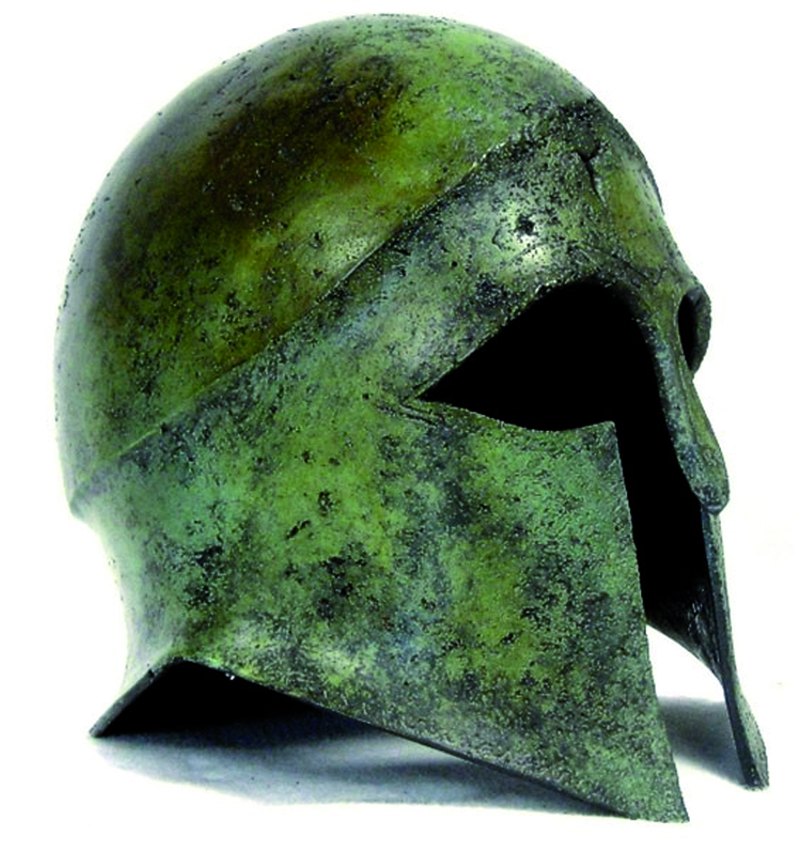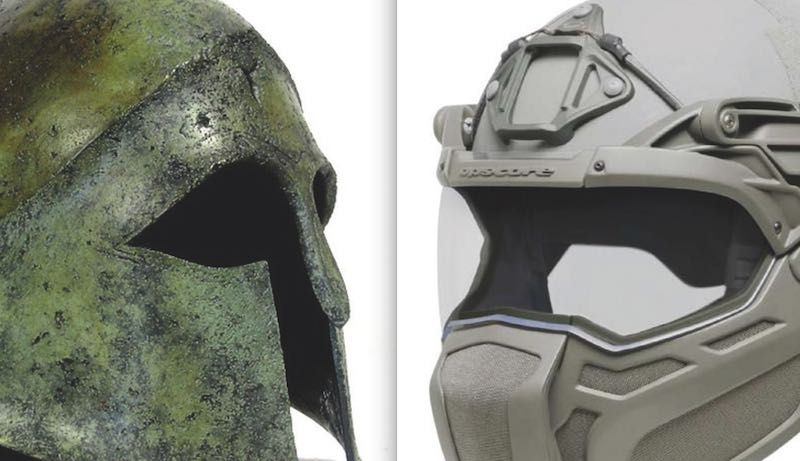Hol Dir den wöchentlichen SPARTANAT-Newsletter.
Dein Bonus: das gratis E-Book von SPARTANAT.

Gear Wissen – Helmi ist da
Früher war alles besser. Da war der Stahlhelm noch aus Metall.
Früher war alles besser. Da war der Stahlhelm noch aus Metall. Heute nennen die Soldaten die professionelle Kopfbekleidung „Plastikschüssel“. Von wegen „Plastik“: Ballistische Helmschalen werden aus modernem Verbundwerkstoff erzeugt. Zum Beispiel UHMW-PE ist auf die Masse bezogen 40 Prozent zugfester als Aramidfaser (Kevlar), 60 Prozent stärker als Carbon- und Glasfaser, fast fünfmal zugfester als Polyamid, Polyester und Polypropylenfaser sowie bis zu fünfzehnmal zugfester als Stahl. Verwendbar im Temperaturbereich von −150 °C bis 100 °C.

Moderner Kampfhelm, 7. Jhdt. v.Chr.: Korinthischer Typ, Wangen- und Nasenschirm, Material Bronze, Gewicht: ca. 2,5 kg
Helme gelten unter anderem als älteste Form der persönlichen Schutzausrüstung und wurden schon im 23. Jhdt v.Chr. von den Sumerern verwendet.
Also verdanken wir den Sumerern nicht nur die Keilschrift (und viele weitere zivilisatorische Errungenschaften) sondern auch den professionellen Einsatz des Helmes als persönliche Schutzausrüstung gegen Waffenwirkung. Anfänglich aus Leder, Messing, Bronze und Eisen gefertigt entwickelte sich der (Kampf)helm bis zum Ende des 17. Jahrhunderts n.Chr. parallel zur steigenden Waffenwirkung ständig weiter. Der militärische Wert der hochentwickelten Schmiedestahlhelme des Spätmittelalters endete jedoch spätestens mit dem verbreiteten Einsatz gezogener Büchsen um 1700. Lediglich bei einigen Kavallerieeinheiten fanden spezielle Helme danach noch Verwendung.
Der erste Weltkrieg und der exzessive Artillerieeinsatz bis in die Fronten des Hochgebirges brachte die Notwendigkeit der Verwendung eines Stahlhelmes für die Infanterie zurück.
Die Anzahl an Kopfverletzungen durch Splitter sank, nach Einführung des M16 Stahlhelmes bei der k.u.k. Armee, schlagartig. Stahlhelme wurden weltweit zum Standard militärischer Ausrüstung.
Seit 1970 tendiert die Entwicklung moderner Kampfhelme vermehrt zur Verwendung alternativer Materialien wie Thermoplastik oder Kunststofffasern (Kevlar, Aramid) und Verbundstoffen.
Vor allem Gewichtseinsparung und Erhöhung des ballistischen Schutzes, aber auch Design und Form kennzeichnen den Kampfhelm des 21. Jahrhunderts. Als Plattform für Zusatzausrüstung (Nachtsichtgerät, Leuchtmittel, Kamera, Kommunikationszubehör) durch Montageschienen aber auch z.B. dem Einsatz von Helmüberzügen sind sie auf den Einsatzort und -zweck individuell abstimmbar.
Mit 2017 verfügt nun auch das Bundesheer in Österreich über den neuen Kampfhelm „SENTRY XP“ in der Form Midcut, des Herstellers OPSCORE. Dieses System ersetzt den aktuellen Kampfhelm, dessen Beschaffung auf das Jahr 1993 zurückgeht (in der Form des US Kampfhelmes PASGT). Wesentliche Vorteile des neuen Kampfhelmes sind das deutlich geringere Gewicht (ca. 920 g im Vergleich zu 1.600 g), der Tragekomfort in Verbindung mit zusätzlicher Schutzausrüstung (Schutzwesten), Individualisierung durch anpassbare Innenpolsterung und Vierpunktkinnriemen, die modulare Erweiterbarkeit durch ARC, VAS, FAST und vorgesehenen Klettflächen.
Persönlicher Eindruck: Die Helme wurden mit vormontierter ARC und VAS in der US Standardfarbgebung Foliage Green bzw. ACU Gray und jeweils zwei Größen-Sätzen Scheitel- und Seitenpolstern ausgegeben. VAS in Leichtmetallausführung und KunststoffARCs. Im Vergleich mit dem ACH von MSA und Gentex (US-Standard) wiegt der Gewichtsvergleich besonders schwer: 1.510 g, der LW-ACH von ArmourSourceLLC immerhin noch 1.360 g.
Fazit: Was bei den Vergleichsmodellen als Upgrade verkauft wird, ist beim OPSCORE Standard – die Innenausstattung. Der mittels Rändelrad im Nackenteil verstellbare Dial Liner lässt den Helm mit einer Fingerbewegung exakt sitzen. In Verbindung mit den optionalen Pads, dem „Leichtgewicht“ und den ballistischen Eigenschaften ein Top-Helm. ARC und VAS sollten für den „Alltagsgebrauch“ demontiert werden, die Klettflächen dienen mangels Helmüberzug als Dreckfänger und Patchausstellung.
Boris Kurnik
Der Sentry XP von Ops-Core im Internet: www.ops-core.com/sentry-xp-mid-cut-helmet/
Helmdesign Vokabular
ACH advanced combat helmet
ARC accessory rail connector
FAST facial armor system
MICH modular integrated communications helmet
NVG night vision goggle
PASGT personnel armor system for ground troops
VAS visual augmentation shroud
SPARTANAT ist das Online-Magazin für Military News, Tactical Life, Gear & Reviews.
Schickt uns eure News: [email protected]
Werbung
Hol Dir den wöchentlichen SPARTANAT-Newsletter.
Dein Bonus: das gratis E-Book von SPARTANAT.



